
Electronic english version since 2022 |
The newspaper was founded in November 1957
| |
|
Number 41 (4739) |
Youth and science
Autumn School is already a tradition!
On 7-11 October, MLIT JINR hosted the Autumn School of Information Technologies. The School brought together 55 students from 11 Russian universities from Voronezh to Kamchatka. The participants learned about distributed computing in experimental and theoretical research at JINR; mathematical simulation and numerical computing; techniques and technologies for processing and analyzing data; the JINR digital ecosystem; support and development of the JINR MICC; automation and monitoring of engineering infrastructure. The School programme also included excursions, practical classes, hackathons and round tables.
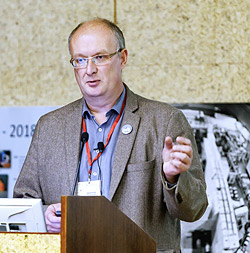 |
| S.V.Shmatov |
Do you mean the staff of the Laboratory?
- Yes, not only our employees, but also visitors, since our scientific plans change dynamically, the new collaborations and areas that we have not so much focused on currently start to develop and we invite well-known Russian specialists to help us to attract the attention of young people. I believe, the fact that we do not have a frozen programme is useful and positive. In addition, the format of the School changes a little and we review our priorities: what was relevant two years ago, today, becomes less relevant, there are new interesting areas, more pressing tasks that we want to focus on. After all, one of the tasks of this School is to offer the participants specific topics for their qualification papers: last year, there were some, this year, there will be others.
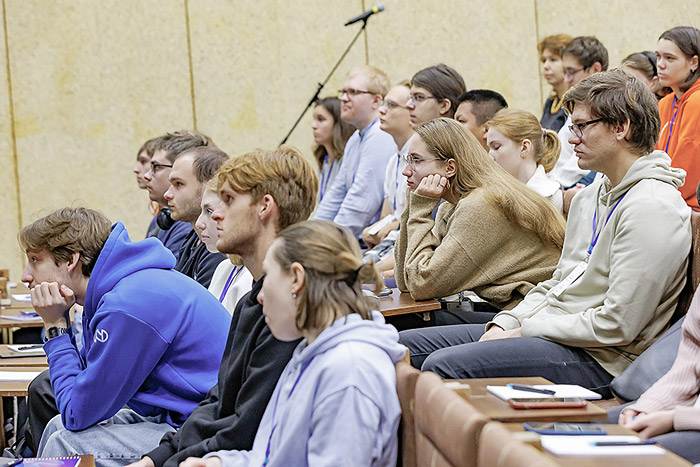
Young faces in the MLIT Conference hall
Does the number of School participants increase?
- It is constant. We would like to have a larger coverage both in universities and in quantity, but there are physical limitations. We not only have lectures, but also practical classes, hackathons, where we need to pay attention to everyone. There are also financial limitations. Maybe over time, the number of participants will be more than 60.
"The third School is already our tradition, one of the best in recent years," JINR Vice-Director L.Kostov opened it. "I would like to thank MLIT Scientific Leader V.V.Korenkov and Laboratory Director S.V.Shmatov that organize this School with great love. It is joyful to see a full hall of young people that wish to dedicate their future activities to information technologies. I am sure that many of you will decide to devote your future to the Institute."

Opening of the Conference. L.Kostov and V.V.Korenkov
"We have held dozens of schools at different universities and at MLIT. Yet, we have realized that the best model is the one we have eventually implemented: inviting motivated bachelors and masters to the Autumn School," Chairman of the School's Organizing Committee V.V.Korenkov said. "They choose an interesting topic for their diploma in a week, work on it with their supervisor at the university and report their results at our spring school. We want to show you the Institute in all its glory: this year, the School participants will be able to learn about the NICA Megascience Project that is a great success, you will see the rest of the basic facilities at the interactive exhibition and learn about the Computer Centre of the Laboratory. We recommend students that demonstrate good results at the School to participate in the July Conference on Distributed Computing and Grid Technologies at MLIT. In my opinion, this School has surpassed all previous ones in its diversity, you will learn about a large number of topics. Dubna is always open for cooperation and we will be glad if this School brings mutual benefit."
"I first came here about 15 years ago," the regular lecturer of these Schools A.B.Degtyarev (St. Petersburg State University) started his greeting, "And I fell in love with this city, this Institute, this laboratory. They study information technologies with a capital letter here. I wish you to take away as much knowledge as you can from here."
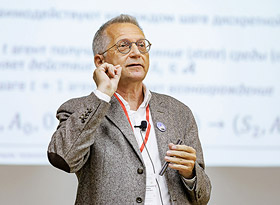 |
| L.B.Sokolinsky |
And for our weekly, L.B.Sokolinsky said, "My interest in this School is quite multifaceted. On the one hand, JINR is an organization that has always been engaged in super-large data, what is currently called Big Data. If they were in the rest of the world 10-20 years ago, then here - probably, 30-40 years ago and possibly, since the founding of the Institute. The Laboratory of Information Technologies is the world leader in the technology of processing super-large data, not just big, but super-large. MLIT has very serious world-class results in the development of these technologies, but there is more and more data and the technologies, accordingly, need to be developed. It ensures the relevance for Russia, for the world community and for our university of the tasks that are met here. My interest in the School as Head of the Department of System Programming is to learn about the advanced technologies for processing super-large data in order to use this knowledge in my research and teaching. In addition, the School is aimed at young people and I think that inviting our students is a certain honor that the Institute and the Laboratory have given to our university. I hope that our students are well prepared and our share of participation in the School will increase. This is relevant for us, since students here obtain the latest information on technologies for processing very large data, distributed computing, supercomputers and other areas of information technologies, including artificial intelligence, and it is interesting and useful for them to participate in such a large-scale event. I am grateful to MLIT Directorate for inviting me here as a lecturer for the second year. I hope to come in the future as well."
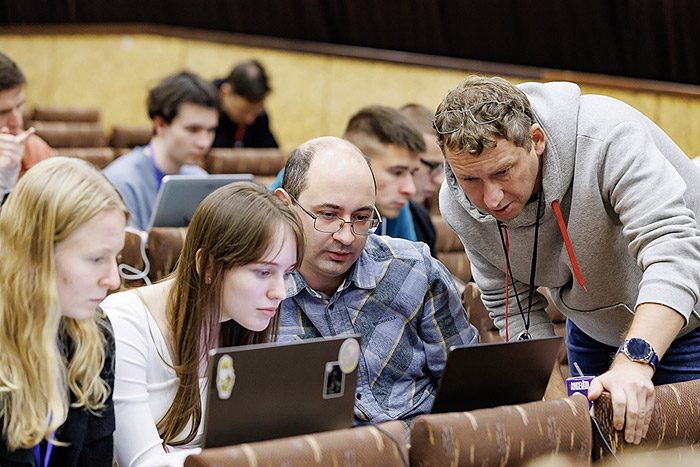
Practical lesson of the School participants
Director of the ISAM of the Dubna University E.Yu.Kirpicheva stated that students here get a unique opportunity to learn about advanced developments first-hand and to take part in them, and wished everyone persistent and fruitful work. The School participants were greeted by Director of the Federal Data Processing Centre of the Ministry of Finance of the Russian Federation N.V.Nebroeva and RUDN professor M.D.Malykh that wished the participants to find their place at JINR - the most interesting scientific centre in Russia.
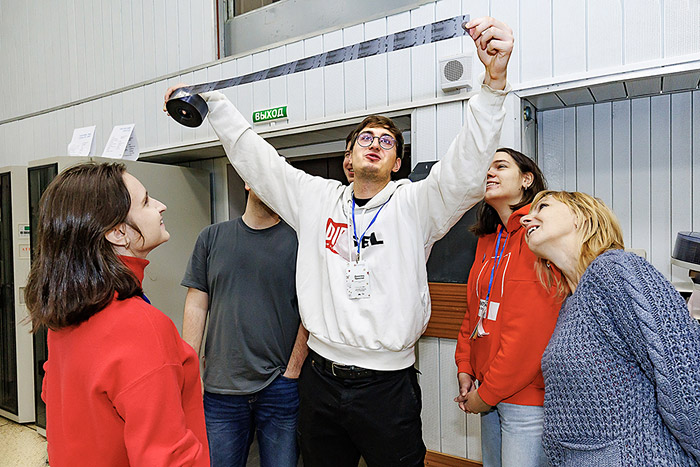
In the museum of the MLIT Computing Centre
On the last day of the School, the students shared their impressions.
Dmitry Kutyin (Vitus Bering Kamchatka State University): My impressions of the School are quite good, we have gained a wealth of knowledge, I chose the topic for my diploma thesis at JINR. Another advantage is that they didn't just throw us into this sea, but showed us everything in advance, united us into teams, encouraged us to reason and to have a little fun, as well as developed a programme for the hackathon. Today, we wait for the results and we hope that we will win.
Nikita Sudilovsky (Vitus Bering Kamchatka State University): I agree with Dmitry, the School programme is very rich and interesting. The city itself is very pleasant, warm, so the impressions are vivid, many new acquaintances and this is also good. I think I will also prepare my diploma thesis here.
Vyacheslav Elistratov (Far Eastern Federal University): It is too early for me to think about choosing a topic for my master's thesis, I am a third-year student, but I hope I will be able to attend the Spring School here with my bachelor's thesis. It was interesting to participate in the practical classes. I was impressed by the enormity of the projects implemented here, the latter applies to both NICA and the Govorun supercomputer, maybe I will be engaged in them in the future.
Elizaveta Konstantinova (National Research University Higher School of Economics, Moscow): We were very interested in the hackathons, we worked intently on fascinating tasks, it turned out that they teach us not so worse at the university, even excellent. The excursions turned out to be super interesting: the level is amazing and at the same time, very clear ideas about the world are developed. When you study, you don't always think, why do you do it? And here, they explained very popularly what and why is researched.
Tatyana Konovalova (National Research University Higher School of Economics, Moscow): I agree with Lisa, we were able to apply our knowledge at the hackathon. The visit to the JINR Museum of Science and Technology was memorable, so much so that I suggested to the teacher at my school to organize an excursion for smart schoolchildren. They will definitely be interested in it and perhaps, it will contribute to their passion for science.
Andrey Budnikov (Voronezh State University): This is my first experience and from the height of a neophyte, this School turned out to be interesting. At least, as a programmer, it was quite interesting for me to look at JINR, the supercomputer and the NICA collider. In general, it was an interesting experience. I still look over diploma projects, since I am a first-year master's student.
"The School has already become traditional, although it is only two years old," Chairman of the Organizing Committee V.V.Korenkov summed up the preliminary results. "The results are already noticeable. And the first: out of 50 participants of the previous School, 30 made diplomas on our topic, 16 currently work with us and 3 gave short reports at this School as specialists. We expanded the topic: added high mathematics, the previous schools did not have engineering infrastructure and for us this area is extremely important, so we dedicated an entire unit to it. There were a lot of reports on deep machine learning, the range and number of topics of bachelor's and master's theses expanded significantly and we tell the participants: if you suggest more interesting topics - go for it!
It should be stated that there has never been such a busy schedule for students as at this School: we held three hackathons and at each one, the participants received a task at six or eight in the evening and in the morning, they had to report on its completion. There was a paper-winner. It was amazing: overnight, the team, using machine learning, analyzed all of the science in China - by publications, areas, and so on, highlighting the areas that are interesting for our Institute, possible ways for cooperation and the best specialists. As the jury members told me, the papers that took the second, the third, the fourth and the fifth places were no worse. And the questions the participants asked were no longer as naive as at the first schools, they were questions from experts. This School brought together stronger and more motivated students, so I think we are on the right path.
I would like to highlight the speech of A.G.Olshevsky at the School that spoke about the Dubna branch of Moscow State University and invited those interested to the master's programme. We hope that the area for training specialists in the field of computing and mega-science projects will be licensed in the coming months and starting next year, we will welcome students to the branch for training in the field of IT. We will prepare them, first of all, for our mega-science projects and for the projects of our partner institutes together with the departments of V.A.Matveev and G.V.Trubnikov.
I can say that we have succeeded in everything: excellent lectures and excursions, practical classes and hackathons, discussions, questions - everything was at a very high level. Let's hope that soon young people with very interesting ideas will join the ranks of the Institute's staff.
And in my memory, the School turned out to be the second event where a participant expressed her love for the Institute and Dubna in poetic form: one of the participants sent her poems to the organizers of the MCE-XXXI Conference and at the opening of the Autumn School, we saw a video recording of the author's performance of a beautiful ode written by the last year's School participant Yury Reikhart (South Ural University) right on the day of its holding."
Olga TARANTINA,
photo by Elena PUZYNINA